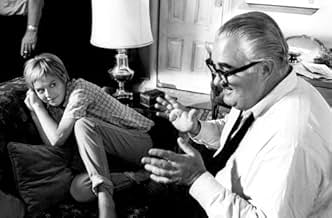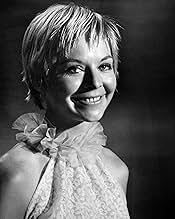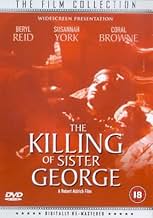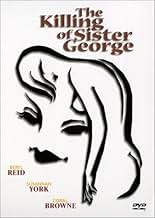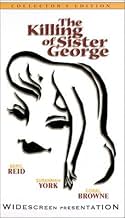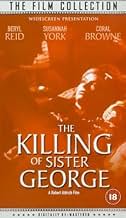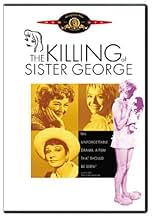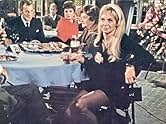IMDb RATING
7.0/10
2.7K
YOUR RATING
The life of a soap opera actress begins to unravel as she fears her character will be written out of the series.The life of a soap opera actress begins to unravel as she fears her character will be written out of the series.The life of a soap opera actress begins to unravel as she fears her character will be written out of the series.
- Awards
- 1 nomination total
- Director
- Writers
- All cast & crew
- Production, box office & more at IMDbPro
Featured reviews
This movie is a heck of a lot more relevant than more recent films dealing with lesbianism -- the shallow, lame DESERT HEARTS comes to mind. Though over two hours long, TKOSG held me with little effort. The action moved freely from the studio to the apartment to the pub. And the seduction scene was totally erotic and ... well ... never mind. Was this particular scene overly long? Only to a generation raised on sex scenes which rarely last as long as it takes to cook a three-minute egg. Explicit? Grow up!
And the performances ... wow! I had no problem with the hold George had over Childie, with Beryl Reid's superior portrayal complemented perfectly by Susannah York's fragile and, at the same time, forceful Childie. I must admit, York was a bit over the top in the beginning, but I wouldn't say that if I didn't count her as one of my all-time favorite actresses. And how about Coral Browne -- she was sensational! Sublty menacing, eerily sensuous -- and when I realized this was the same woman from AUNTIE MAME and LYLA CLARE, well, I nearly fell off my chair. I love this lady!
And the performances ... wow! I had no problem with the hold George had over Childie, with Beryl Reid's superior portrayal complemented perfectly by Susannah York's fragile and, at the same time, forceful Childie. I must admit, York was a bit over the top in the beginning, but I wouldn't say that if I didn't count her as one of my all-time favorite actresses. And how about Coral Browne -- she was sensational! Sublty menacing, eerily sensuous -- and when I realized this was the same woman from AUNTIE MAME and LYLA CLARE, well, I nearly fell off my chair. I love this lady!
I did not see the stage play upon which this film is based (too young) but, based on its own merits, this film surely deserves a closer look.
The central trio of performers (Reid, York, Browne) provide career "bests" and there are some amusing vignettes from the others (Fraser, in particular, as a truly odious soap actor).
The much-discussed sex scene is, by today's standards (and, it would seem, even those of the 1960s stage play), tame, but its real value as a display of the shift of power between the three central characters is very neatly worked through in the closing quarter.
The final five minutes of (self-) destruction is heartbreaking, with excellent use made of the music track.
In short: miss it and miss out.
The central trio of performers (Reid, York, Browne) provide career "bests" and there are some amusing vignettes from the others (Fraser, in particular, as a truly odious soap actor).
The much-discussed sex scene is, by today's standards (and, it would seem, even those of the 1960s stage play), tame, but its real value as a display of the shift of power between the three central characters is very neatly worked through in the closing quarter.
The final five minutes of (self-) destruction is heartbreaking, with excellent use made of the music track.
In short: miss it and miss out.
Robert Aldrich is a director who rarely gets the attention he deserves. Ridiculously versatile he made the fascinating Film Noir 'Kiss Me Deadly', the gothic black comedy 'Whatever Happened To Baby Jane?', and the macho "tough guys on a mission" action classic 'The Dirty Dozen' to name just three in a long career. Just to emphasize that he could do just about anything, one of the first movies he made after 'The Dirty Dozen' was 'The Killing Of Sister George'. It's hard to imagine two more different movies! George is a very English picture about a much loved soap opera star (played by Beryl Reid) who has to juggle a career crisis with a complex lesbian relationship (her lover being played by Susanna York). Reid was well known to British audiences through her TV work, especially a couple of highly popular John Le Carre adaptations. Reid originated the Sister George role on the stage and she really makes the most of it in this movie. Her performance is terrific, hilariously bitchy and also very sad and pathetic. York is also good, and the lesbian subject matter must have been very shocking for the time. It may look a little dated now, but in context it is quite sensitively handled. There are some great actors in the supporting cast, most notably Coral Browne ('Theatre Of Blood') who plays a TV producer who has her eye on York. 'The Killing Of Sister George' deserves a bigger audience. I highly recommend it and hope that anyone who enjoys it looks further into the career of the Robert Aldrich, a seriously underrated film maker!
this is a showcase for some magnificent acting....it doesn't seem at all homophobic , but rather immensely poignant and sad...and in what other film do you get to see a great lesbian band in matching sweaters and guitars (good solo!) Difficult at the beginning, just seems shallow and bitchy, but stick with it and watch Beryl Reid's character disintegrate....the final scene reminded me of "The Blue Angel" or "The Entertainer" in its shattering degradation...congrats to Aldrich for having the guts to make this movie, I think it stands the test of time rather well. Coral Browne is also magnificent, and York holds her own. The lesbian bar scene is worth waiting for.
Seeing Beryl Reid mouth silently a four-letter swear word when such things didn't happen in films and drunkenly canoodling with two young nuns in the back of a London cab is both quite outstanding and rather lovable.
Miss Reid, who I only got to see in my childhood as a twee, granny-like innocent (the sort that she plays for real in a TV serial as Sister George, a homely district nurse), I found The Killing Of... both delicious and ever astounding in its frankness and of her rather warped relationship with the much younger Susannah York.
Warped, not because of the age difference, nor of their same-sex partnership, but because June Buckridge (Reid) has a cruel streak that is borne out by her playing sadistic mind games with Alice "Childie" (York).
Sister George, in the best tradition of TV soaps, is being killed off, to make way for an Australian replacement. Hence June's venomous outpourings and increasingly erratic behaviour.
Equally interesting is the London of the late '60s, both in its landmarks but also its people and fashions, whether that's in how they live and/or how they dress and present themselves.
Though real soaps cover such material freely and openly these days, 42 years ago, it must have been a very different kettle of fish. Lesbianism back in those days was not only considered immoral but also a mental aberration and had to be so hidden, in an attempt to prove to those 'righteous' souls that it did not exist. Therefore, it must have been a very brave undertaking as a film, though it originated as a play, written by Frank Marcus.
Having now seen it again, I consider Robert Aldrich's ground-breaking film to be a bit of a classic and one, which, no doubt I'll want to see again in a few years time. It really is a piece of British cinematic history.
Miss Reid, who I only got to see in my childhood as a twee, granny-like innocent (the sort that she plays for real in a TV serial as Sister George, a homely district nurse), I found The Killing Of... both delicious and ever astounding in its frankness and of her rather warped relationship with the much younger Susannah York.
Warped, not because of the age difference, nor of their same-sex partnership, but because June Buckridge (Reid) has a cruel streak that is borne out by her playing sadistic mind games with Alice "Childie" (York).
Sister George, in the best tradition of TV soaps, is being killed off, to make way for an Australian replacement. Hence June's venomous outpourings and increasingly erratic behaviour.
Equally interesting is the London of the late '60s, both in its landmarks but also its people and fashions, whether that's in how they live and/or how they dress and present themselves.
Though real soaps cover such material freely and openly these days, 42 years ago, it must have been a very different kettle of fish. Lesbianism back in those days was not only considered immoral but also a mental aberration and had to be so hidden, in an attempt to prove to those 'righteous' souls that it did not exist. Therefore, it must have been a very brave undertaking as a film, though it originated as a play, written by Frank Marcus.
Having now seen it again, I consider Robert Aldrich's ground-breaking film to be a bit of a classic and one, which, no doubt I'll want to see again in a few years time. It really is a piece of British cinematic history.
Did you know
- TriviaThe lesbian lovemaking scene so disgusted Robert Aldrich's longtime composer friend Frank De Vol that he quit the production and didn't work with Aldrich for several years.
- GoofsWhen George asks for a pint of beer the waiter arrives with it on a tray and it is half full with half a glass of head but when he puts it on the table it's much fuller, with only about an inch of head on it.
- Crazy creditsDuring the opening credits, the picture distractingly flips from left to right as the main character travels through claustrophobia-inducing alleyways.
- ConnectionsFeatured in Before Stonewall (1984)
- How long is The Killing of Sister George?Powered by Alexa
Details
- Release date
- Country of origin
- Language
- Also known as
- Le prix de la gloire
- Filming locations
- Production companies
- See more company credits at IMDbPro
- Runtime
- 2h 18m(138 min)
- Sound mix
- Aspect ratio
- 1.85 : 1
Contribute to this page
Suggest an edit or add missing content


